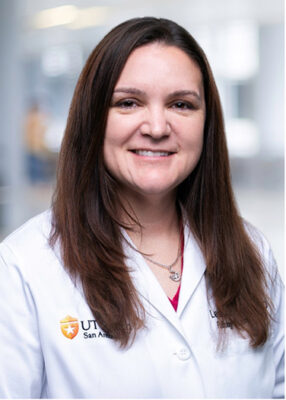Residency
*** We will be accepting applications through the AAMC’s computerized ERAS (Electronic Residency Application System) for July 2026 on September 24th, 2025.***
Overview:
The pathology residency program at UT Health San Antonio is a four-year, combined Anatomic and Clinical Pathology program. The overall goal of the Pathology Residency Program is to provide comprehensive training in the practice of pathology and laboratory medicine.
The training program provides an appropriate balance between service obligations and educational opportunities. The residents are provided with opportunities and are expected to take ownership of patient case material and function as integral members of the health care team.
The Pathology Residency Training Program at UT Health San Antonio provides opportunities in postgraduate training in Anatomic and Clinical Pathology by utilizing the facilities of the University Hospital, the UT Multispecialty & Research Hospital, Audie Murphy Veterans Hospital, and South Texas Reference Laboratories at UT for core rotations. This experience is augmented by rotations at South Texas Dermatopathology Laboratory, and the Bexar County Forensic Sciences Center. The varied patient population at our teaching hospitals and the activities at the research laboratories at UT Health provide an environment in which this goal may be accomplished so that all residents may be board eligible in Anatomic and Clinical Pathology with up to four years of post-graduate training for medical school graduates.
Curriculum:
Pathology residents experience hands-on, active learning. An individualized, flexible training schedule with integrated Anatomic and Clinical pathology rotations throughout training helps residents achieve their career goals and provide a well-rounded experience. Rotations are most often completed in 4 week rotation blocks, though various 2 week rotations and electives are available.
The combined AP/CP program requires four years of training and includes approximately 24-month core program in anatomic pathology and a 19-month core program in clinical pathology. Approximately 5-6 months of elective time are available as a PGY2-PGY4s with opportunities available in numerous subspecialty areas. A one month elective at another training institution may be pursued if desired. A one month elective can also be utilized as protected research time or a dedicated lab management rotation.
Core surgical pathology rotations are performed as general pathology sign out with routine subspecialty sign out for gynecologic pathology at University Hospital and subspecialty dermatopathology sign out at the VA. General surgical pathology rotation cycles include:
VA (2 day cycle)
- Preview
- Sign out/ Gross
UHS (4 day cycle)
- Frozens
- Grossing
- Preview
- Sign out
Additional subspecialty/ organ based surgical pathology experiences are available as electives. Autopsy is comprised of 4 week rotations for a total of 3 months, where the first rotation is combined with dermatopathology, the second is combined with clinical informatics materials and the last rotation is combined with forensic pathology at the Bexar County Medical Examiner. Core rotations in clinical pathology provides hands on experience in daily clinical diagnostic challenges and experiences in laboratory management.
Many core rotations allow for advancing autonomy and graduated responsibility. The Advanced Surgical Pathology rotation and MSRH anatomic rotations allow senior residents to be acting surgical pathology fellows with corresponding duties. The core Advanced Clinical Pathology rotation at the VA and the MSRH Clinical Pathology rotations allow a trainee graduated experience as the acting “medical director” who covers diagnostic interpretations/consultations in hematopathology, clinical chemistry, microbiology, transfusion medicine and all laboratory management/ quality issues
Required and Elective Rotations 2022
Sample AP/CP – 4 Year Rotation
Fellowships:
Advanced fellowship training in Clinical Informatics, Cytopathology, Hematopathology, Surgical Pathology, and Transfusion Medicine are also available.
Research:
All residents are encouraged to participate in clinical research both in anatomic and clinical pathology. Additional opportunities for both basic and clinical research are available with faculty who have varied research interests.
During residency, each resident is expected to undertake and complete a scientific project to be published as a peer-reviewed state or national abstract/paper. This is to give the residents exposure and experience in formulating hypotheses, working through a well-controlled project and organizing data suitable for publication.
Conferences:
The Resident conferences have been organized to provide a combination of didactic lectures in AP/CP, working conferences to review the most recent cases, and exposure to basic research and quality assurance.
Conference Descriptions Revised 8-2022
Sample Schedule of Conferences
Teaching:
Residents have opportunities for teaching experience in their interaction with medical students and residents from other fields while they are on pathology rotations. Residents also participate in the teaching of the group lab sessions within the preclinical medical student pathology course. Advanced teaching experiences are available based on the resident’s interest.
Resources & Additional Perks:
Each resident within the resident room is provided a personal desk, microscope, web cam, and dictation microphone.
A personal book fund of $800 is provided for each resident per year for pathology-related texts/resources, STEP3/COMLEX3 exam fees, Board exam fees and state licensing fees.
An additional travel & registration fund is provided for residents who present and attend state or national meetings.
The pathology program provides individual subscriptions to PathPrimer (question bank), Expert Consult (Digital Pathology Text Books), Immunoquery, and the ASCP University of Pathology Informatics certificate course.
A shared physical & digital pathology library of pathology texts is maintained and updated.
UT Health San Antonio provides on line database access to various resources including, but not limited to PubMed, OVID, Up to Date, and full access to online text books through Clinical Key.
Catered lunch or breakfast is provided at least three times a week along with protected educational time during didactic sessions.
Summary:
The overall design of this residency training program has been accomplished after many hours of work by contributing faculty and the Program Effectiveness Committee composed of resident, fellow and faculty representatives. The combination of structured core rotations and less structured, advanced level training provides residents with a strong basic fund of knowledge while allowing pursuit of individual interests and career goals.
AP-CP Pathology San Antonio Meet Our Faculty (PDF)
Our current residents
Recent Graduates (PDF)
Contact us:
 Leslie J. Greebon, MD
Leslie J. Greebon, MD
Pathology Residency Program Director
UT Health San Antonio Dept. of Pathology
7703 Floyd Curl Drive
San Antonio, TX 78229-3900
Tel: 210-567-4010
 Anaiza Rodriguez, MPH
Anaiza Rodriguez, MPH
Residency Program Coordinator
UT Health San Antonio Department of Pathology and Laboratory Medicine
Email: Rodrigueza86@uthscsa.edu Voice: 210-567-4115
Connect With Us:
Stay up to date with our residency program, highlights from our residents, and life at UT Health San Antonio:
Follow along for program updates, resident life, educational content, and a closer look at our pathology community.
-
About San Antonio
- A modern, vibrant city, rich in heritage with colorful personality forged across three centuries. Its unique mixture of native Mexican, German and Spanish influence is noticeable in the city’s distinctive architecture, music, arts, and cuisine.
- Learn more about San Antonio
Dedicated Faculty
Our faculty members are committed to providing an outstanding education through bedside clinical teaching experiences as well as mentoring.
We provide a comprehensive curriculum that trains our graduates to be outstanding clinicians, educators and leaders in the field of Pathology.


